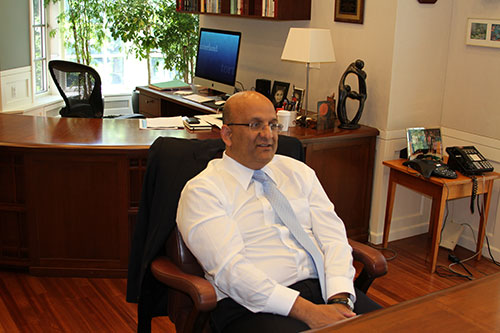 On May 4, 2010, Nitin Nohria made history when Harvard University President Catherine Drew Gilpin Faust appointed him Dean of the Harvard Business School. His term began from July 1, 2010. He is the first Indian American to be appointed to this position. When we asked him about his first thought on hearing about his appointment, he told us that it felt like a dream. It left him humbled and honored and with a great sense of gratitude and responsibility. Nohria has always said that his story is a vivid reminder of how meritocratic American society is where an immigrant on a scholarship to a graduate school can be chosen as a dean of one of the country’s leading business schools.
On May 4, 2010, Nitin Nohria made history when Harvard University President Catherine Drew Gilpin Faust appointed him Dean of the Harvard Business School. His term began from July 1, 2010. He is the first Indian American to be appointed to this position. When we asked him about his first thought on hearing about his appointment, he told us that it felt like a dream. It left him humbled and honored and with a great sense of gratitude and responsibility. Nohria has always said that his story is a vivid reminder of how meritocratic American society is where an immigrant on a scholarship to a graduate school can be chosen as a dean of one of the country’s leading business schools.
Nohria was born in Nohar, Rajasthan, in India. His father, Kewal Nohria, was the Chairman of Crompton Greaves in India and was a great influence upon Nohria’s decision to embark upon a career in business. Nohria graduated from St. Columbus School in New Delhi, following which he earned a B.Tech in Chemical Engineering from the Indian Institute of Technology (IIT) Bombay and earned a Ph.D. in Management from the MIT Sloan School of Management. He met his future wife, Monica, in India and told us that one of his best decisions was to convince her to marry him and to follow him to USA. They have two daughters. Currently, he lives with his family at Dean’s house on the HBS campus. He is also the first dean to live at Dean’s House since Dean Lawrence Fouraker lived during the 1970s.
Nohria has also continued to build relationships with India and it is during his term that Harvard Business School has received a $50 million dollar gift from India’s Tata Group, the largest gift from a foreign donor in the school’s 102-year history. He is a strong leader believing in excellence and leadership from an early age, teaching his graduates that leadership is about competence and character and the value of three Ts: Truth, Trust and Thankfulness in creating value in the world.
 Interviewing him for Chai with Manju was an enriching experience. It was inspirational as he talked about gratitude and leadership, and emotional as he talked about his mother, a cancer survivor who lives each day to its fullest. At times, serious when he talked about value of education and equal opportunities for all. So much fun when he told us that his favorite song was: “jalte hein jiske liye teri aankhon ke diye” and to our tremendous surprise sang it beautifully for us. His extraordinary sense of humor surfaces when he says that his fantasy is to be “offered a small, unimportant, inconsequential role in a Bollywood movie.” He said he has met most Bollywood stars thanks to his wife who is from Juhu in Mumbai and a big Bollywood fan. No one has come forward to offer him that coveted role yet. Simply an amazingly grounded man who heads the most prestigious business school in the world and says that perhaps the biggest change that he has noticed in people since he got appointed to the job is that he is now Dean and no longer “Nitin.”
Interviewing him for Chai with Manju was an enriching experience. It was inspirational as he talked about gratitude and leadership, and emotional as he talked about his mother, a cancer survivor who lives each day to its fullest. At times, serious when he talked about value of education and equal opportunities for all. So much fun when he told us that his favorite song was: “jalte hein jiske liye teri aankhon ke diye” and to our tremendous surprise sang it beautifully for us. His extraordinary sense of humor surfaces when he says that his fantasy is to be “offered a small, unimportant, inconsequential role in a Bollywood movie.” He said he has met most Bollywood stars thanks to his wife who is from Juhu in Mumbai and a big Bollywood fan. No one has come forward to offer him that coveted role yet. Simply an amazingly grounded man who heads the most prestigious business school in the world and says that perhaps the biggest change that he has noticed in people since he got appointed to the job is that he is now Dean and no longer “Nitin.”
QUESTION: What was the first thought that crossed your mind when you heard that you were appointed Dean of HBS?
NITIN NOHRIA: It was as if I was in a dream—I couldn’t believe it was happening to me, as I truly had never expected to be Dean of HBS. I felt honored and humbled. I experienced an immense sense of gratitude and responsibility to serve an institution that had made such a difference in so many people’s lives, including my own.
Q: You are the first Dean since Dean Fouraker in 1970s to live in Dean’s house on campus. What made you decide to live there?
NN: One of the most distinctive features of HBS is that even though it is a graduate school, almost 90% of our students live on the campus. The Dean’s House was built as part of the original 1920s master plan so that the Dean and his family could be part of this residential environment. I wanted to return to this tradition and it has turned out to be a wonderful way for my family and me to feel more connected to our community.
Q: You were one of first of management professors to suggest professional oath of conduct for management students much like oath of Hippocrates for doctors. What was the rationale behind it?
NN: Business leaders play a profoundly important role in society. Just as doctors are entrusted with society’s health, business leaders are entrusted with society’s economic prosperity and progress. So in the same way that the Hippocratic oath provides doctors with a framework for how to think about their responsibility towards society, I have long believed that business leaders would benefit from a similar shared framework that might provide guidance for how to think about their responsibility towards society.
Q: You apologized for sexism on campus. You are a father of two daughters. Has that influenced your thinking in any way?
NN: Everyone deserves the opportunity in life to pursue their dreams, whatever they may be, to the fullest. One of the most important values of higher education is that it levels the playing field. Places like HBS should provide everyone who comes to campus the opportunity to succeed, irrespective of their background. I certainly experienced that myself. The School gave me more opportunities to thrive than I could have imagined. So when I became Dean I committed myself to making that true for everyone. It had been 50 years since we admitted women and yet when we looked hard at the data, women didn’t always thrive at HBS equally relative to men. As the father of 2 daughters and the husband of a woman who has an MBA and has worked her entire life, I certainly want a world in which they don’t feel as though their opportunities are any different than mine.
Q: What are some of the changes that you have made since that apology?
NN: To help creative a more inclusive culture in which everyone can thrive, we have worked hard to make the culture of the School more supportive of women, we have made a commitment to increase the representation of women in our cases, we have launched a new gender initiative that will encourage research on how women can thrive not just in our organization but across all organizations, and we are working hard to support women throughout their careers. We believe the lessons we learn from our efforts to be more inclusive towards women will also help us be more inclusive of all other identity groups.
Q: You made a statement that it would have been harder for you to become the dean of the Indian Institute of Management in Ahmedabad than to be the Dean of Harvard Business School. Can you explain that statement?
NN: One of the things I admire most about America is how much it is a meritocracy and how committed it is to providing opportunity to people irrespective of their backgrounds. In India the Director of IIM is in the end a political appointment—it has to be approved by the Prime Minister. That creates the possibility of politics intervening in decisions. Here at HBS, which is an iconic American institution, one might think it would be hard for a person of Indian origin to become a dean. Yet when a new dean had to be chosen, my background played no role in the decision. It was simply a question of whether I was capable of doing the job.
Q: You have written 16 books. Which one is your favorite and why?
NN: Asking this question is like asking who is your favorite child. Nevertheless, it’s not uncommon to have the greatest affection for the first book you write, simply because it is the first. For me, that was Beyond the Hype: Rediscovering the Essence of Management, which I wrote with Bob Eccles. Even today, if I have a favorite, that is it.
Q: You said that you were very inspired by your dad. What were the most important lessons that you have learnt from your dad?
NN: The most important lesson I learned from my father was the extraordinary power business has to make a positive difference in society. I witnessed this first hand in the way he led his company. Every day he believed that the products and services his company provided could make the lives of the customers it served and the people it employed better. I saw how factories the company built created communities that prospered. Every day at HBS I am inspired by this possibility that we can educate leaders who will make a difference in the world.
Q: What is the most important lesson that you have taught your daughters?
NN: I said at our most recent graduation that one of the most important qualities people should have is a sense of gratitude. From the time they were little I’ve always asked my daughters at bedtime to say the three things that they are most grateful for. I believe that even on your worst day there are things that you can feel grateful for. I hope that this sense of gratitude is something they will carry with them as an important lesson they learned from their father.
Q: How did you meet your wife and what is her best quality?
NN: I met my wife in India before coming to graduate school. My greatest accomplishment was to convince her to follow me to the United States and to marry me. Her best quality is that she is infinitely patient.
Q: Where does Nitin Nohria see himself in ten years?
NN: Hopefully at a place where I can look back at my time at Harvard Business School and feel that I’ve borne my responsibility with care. That I took an institution that I love deeply and made it better.
Q: What is your biggest challenge as Dean of HBS?
NN: To ensure that an institution that has a hundred year legacy of excellence continues to relentlessly innovate to remain a leader in business education.
Q: What do you recommend to young kids who want to do an MBA from HBS? Are there any specific types of candidate that HBS looks for?
NN: I tell them to take their education seriously. To try and excel at something. To pursue some passion outside of their education. To step up to leadership opportunities wherever they arise, from the sports field to the classroom, from internships to when you begin work, from local communities to the larger global stage. Opportunities to show leadership abound, even at an early age. What distinguishes Harvard Business School students is that they show this leadership spark throughout their career.
Q: If Nitin Nohria was a businessman then what would he choose?
NN: Run an industrial company, manufacturing like my dad.
Q: Do you believe in destiny?
NN: No. I am an Aquarian. When I was younger then I was interested in sun signs but not anymore.
Q: Do you think that destiny played no role in your super success?
NN: I do believe that I have earned it and have been very fortunate to be surrounded by circle of well wishers. I have been very lucky that way.
Q: How do you think that your mom has influenced you?
NN: My mom is a cancer survivor and loves life. She loves doing things and has a great circle of friends. She wakes up each day and looks at each day with excitement
Q: One difference that you notice in people since you became Dean?
NN: Now I am Dean, no longer Nitin. I am a very private person which has changed now.
Q: What is your hobby?
NN: I love sports. I am truly affirmative action sports fan. I can watch any sports and lose myself for that short period of time. I can watch curling. I can watch any sports, you name it. My favorite release is to watch sports.
Q: Did you watch World Cup? What did you think of the Brazilian team?
NN: Yes. I did. I watched more matches than my wife probably could stomach•Brazil was an example of how much sometimes your dependence on one or two players are not even obvious till those players are taken away. The weakness of the (Brazilian) team was masked by the presence of Neymar (da Silva Santos) and the defender (Thiago) Silva. It is a useful reminder in general to all of us that how sometimes when we have very strong leaders or strong people in our teams, our own weakness can be hidden by them.”
Here are Nohria’s answers to our rapid response questions:
If you could go back in time and change your career then what would that be?: Astronaut.
Biggest strength: Curiosity.
Biggest weakness: Impatience.
Mentor: My father.
Favorite movie: Godfather and Lagaan.
Favorite sport: American football though I love all sports.
Favorite actress: Amy Adams, especially in American Hustler.
Favorite Indian actor: Aamir Khan.
Favorite song: Jalte hein jiske liye… [sings it beautifully for us.]
Favorite song writer: Gulzar.
Favorite singer: Mukesh.
Last movie that you loved: Budapest Hotel.
Fantasy: Any inconsequial role in a Bollywood movie—even Ramu chai lao.
Favorite food: Aloo paratha.
Favorite travel destination: Barcelona.
Book: Narcissus and Goldmund (also published as Death and Lover) by Hermann Hesse.
Quote: Be the change you want to see in the world—Mahatma Gandhi.
What is the one thing that you do not like in people: Fearfulness.
What is the quality that you admire most in people: Integrity.
Two things that you never compromise on: Working when I have to and speaking the truth when I have to.
When you think of education what is the first thing that comes to your mind: Changing people’s lives.
Corporate greed in America is: Corrosive.
Last word on Chai with Manju: I am always surprised that anyone is interested in what I have to say.

